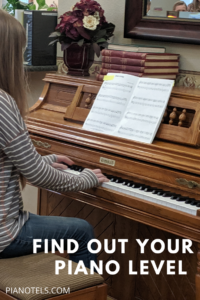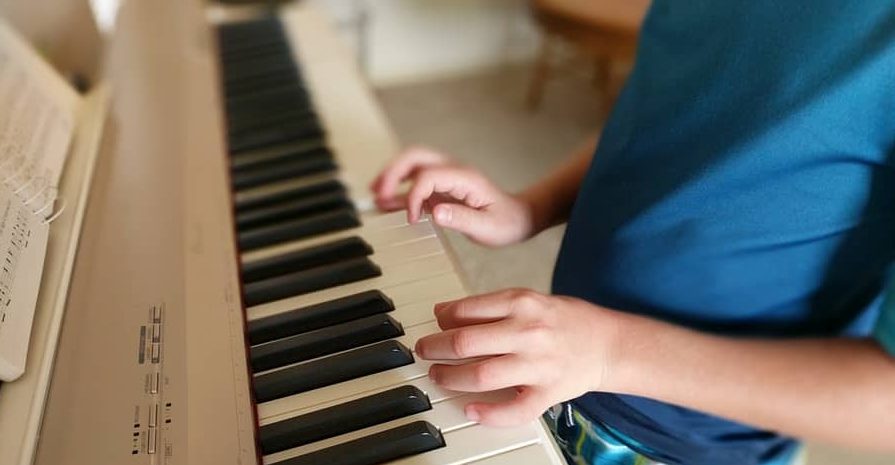
When you are browsing through music, it becomes important to be able to know what level you are at before you purchase the music.
Check the following list to see what skills and knowledge you have to figure out your piano level.
Primer (Level pre-1):
- Knows finger numbers
- Knows musical alphabet
- Basic staff awareness
- Basic keyboard awareness
- Can play one hand at at time
- Has proper hand placement and form
- Developing rhythm and steady beat
- Generally music from method books
- Generally practices 10-15 mins/day
Beginner (Levels 1-2):
- Bass and Treble Clef
- Plays both hands together
- Play rhythms more comfortably
- Keeps steady beat
- Left hand plays mainly basic chords
- Dynamics and articulations
- Can play C, G, and F key signatures
- Generally practices 15-20 mins/day
Late Beginner (Level 3):
- Major and minor chords, scales, and arpeggios
- Left hand becomes more complex
- More complex rhythms introduced
- Can play songs with 2 flats/sharps
- Technique developing
- Sight reading developing
- Musicality developing
- Generally practices 20-30 mins/day
Intermediate (Level 4-5):
- Harmonic, melodic minor chords, scales, and arpeggios
- Left hand and right hand can play independent of each other
- Knows music theory and notation well
- Growing knowledge of chords and progressions
- Technique more solid
- Musicality more solid
- More music played away from method books
- Generally practices 30-45 mins/day
Late Intermediate (Level 6):
- Can play most songs of any repertoire
- Sight reads comfortably
- Knows music theory thoroughly
- Excellent technique
- Excellent musicality
- Generally practices 60+ mins/day
Advanced (Level 7+):
- Advanced knowledge of theory
- Can play any song of any repertoire
- Can sight read intermediate songs very well
- Can play in all key signatures
- Advanced rhythms, technique, and musicality
- Generally, you know you are advanced if you don’t need to ask what level you are at
- Generally practices 2-3 or more hours/day
Of course, this is just a general outline and each person needs to determine for themselves exactly where they are placed. Some students may be more advanced in some areas than others, so that will also affect the level they are listed at. You may want to consider some of these other factors we will discuss further.
Looking to level up on your piano?
Combining all that I have learned in teaching piano on and off for the past 17 years, I have created my very own, all virtual Learn with Pianotels program that is proving to be phenomenal for students. With a self-paced step-by-step course, the latest technology, and video chats available at any time, students are not only having a blast learning piano, they are also learning piano 8-10x faster than traditional lessons. I can’t be more excited about this program and the results I am seeing!
Just because it is tailored for kids, don’t let that hold you back from trying it out yourself. Adults have benefited just as much from kids in this course! So even though it is advertised for kids, give it a go. Learn with Pianotels is affordable for the whole family!

What piano level am I?
Truly, there is no hard set rule for what level you are at and what you need to do to be considered at the next level. Piano levels can vary from country to country, and even from region to region within a country. You may be considered advanced in your own small town, but not when you get to the big leagues.
Also, a piano level does not determine where you are at in your capabilities of composing music or improvisation. Those skills can come with greater knowledge of music theory and technique, but there is not a lot of ways to standardize what level you are with composition or improvisation.
So what’s your purpose in needing to know what level you are?
If you are wanting to know what level you are in order to purchase music, then the list in this article is a good starting point. You may get frustrated by purchasing material that is not exactly the level you think it was listed at. Because there is no standard rating for piano levels, then there is going to be a lot of leeway for personal interpretation when it comes to deciding a level. It’s best to understand that and be forgiving of that as you purchase music.
If you are wanting to know what level you are at so that you can apply to a program or find a teacher, then a list of what you are capable of is much more accurate then stating a piano level. List the theory you do know. List examples of some of the songs you can play or the books you have been playing from. A recording of a song you can play will tell a person a lot about what level they are on.
If you want to know what level you are at just for your own benefit, then make this list a set of goals. If you can achieve these things within these levels, then seek to do a little better and get a little more advanced. More practice can definitely help you achieve the next level and get you to that next stage.
What level am I if I play be ear?
What this list and others you will find on the internet or in method books do not consider is if you can play the piano by ear. If you have the capability (and if you don’t, you can learn it), then this list is kind of irrelevant. You don’t really need to know what level you are at, because you play be ear anyway!
There are some pianists that I would consider at an advanced level, but they can read any music. Just because they can’t read music and they don’t know all of the music theory, technique, major/minor, etc, does not mean that they wouldn’t be considered advanced. These talented artists can be concert pianists and yet not answer to any of the advanced theory required to be considered “advanced”.
Thus, there are times that levels need to disregarded for pure talent. No need to judge what level you are on if you fall into this category.
How do I get to the next level?
If you are asking this question, that’s a good sign! Because the thing you need most in order to get to the next level is you have to want to! Without the desire, you don’t really advance very much. This is seen all the time in students as they drop out of piano. Its hard to advance if they aren’t motivated. No amount of practice will truly get you to the advanced level without a great deal of desire to get there first.
Once you have the desire, then you may need a good teacher. If you choose to teach yourself, it can be done as is seen by many YouTubers today.
But if you are really looking for a great course, you have got to check out Pianoforall. It is an online piano program that has been used over and over (with over a quarter million students) by students since 2006 and it still is rated as one of the best courses you can take online. The testimonials are phenomenal, its return rate below 4%, and it is extremely affordable with only a one time payment and free updates for life.
Regardless of who your teacher is, you need to be constantly learning. Practicing the same thing over and over again will not get you to the next stage. This happens to a lot of pianists where they get to the desired stage and then remain there for forever afterwards. Without continuing to choose new music repertoire the level you are at will stay stagnant.
Choose music that pushes you a little more than you can do now. Music that you can sight read easily is not going to help you advance. Although that is important to keep that skill up too, you don’t want to spend all your time playing music you can just sight read. Choose music that you have to push yourself on. You won’t be able to play it the first time through, but with diligence, you will be able to.
It is also important to note that memorization is a large key to what makes pianists advanced. Advanced pianists have paid the price to be able to memorize music immediately. So working on your memorization skills is a great way to help you to advance in your piano.
How can I find what level my music is at?
If you have a piece of music you would like to know what level it is, there are a few options to look into. You can google it to find out if someone has graded that on the internet. You can find it within a method book and determine what level that method book is listed as. If you do this, you may find that not all method book consider a piece of music on the same level. So compare with several before you decide for sure.
It can also get tricky when a piece of music appears to be an easier level than it is. Sometimes there are elements about the music that make it more advanced even though it appears to be on a simpler level.
Experience helps in determining what level a piece of music is. In the beginning it can be difficult, but the more that you do it, the easier it becomes. Comparing music to other pieces of music can also help you figure out the level.
Related questions:
How many grades are there for piano? The ABRSM has 8 grades. The Associated Board of the Royal Schools of Music (ABRSM), based out of London, is a program that provides examinations around the world. The ABRSM has exams that test three areas: scales and arpeggios, sight reading, and aural. Method books generally have about 5 grade levels.
What are some piano certification programs? The Music Teachers National Association (MTNA) has a program for teachers to certify in. The Royal Conservatory of Music has a certified program for teachers. Valley City State University (VSCU) provides a program for students to receive certification. Many method books also provide certification at the end of the book which your teacher could complete for you.
Related Articles:
How much time do pianists practice every day?
How hard is it to learn piano?
How to teach piano: full lesson plans and all you need
How to play piano: your complete guide
Best Piano Sheet Music & Books
Tel loves her life as a piano player, a piano teacher, and a mom. Amid piano blogging, piano teaching, and piano playing, she loves a chance to fit in a good exercise class, volunteer at her kids’ school and at her church, and go on long dates with her husband. Full bio at About Tel.



aha- to play ‘be’ ear…………….. 😉
i am 13 and i am doing my grade 6 piano exam next week
That’s so awesome! Good luck!
I grade 7 well level
I am a intermediate at the age of 8 1/2 so I think I am PRETTY good for my age. I am going to play fur elise for my next piece so yea.
I am intermediate, my age is 8
That’s great! You will make a great pianist!
So… I’m level six? Cool.
I am a teen that needs more work on piano.